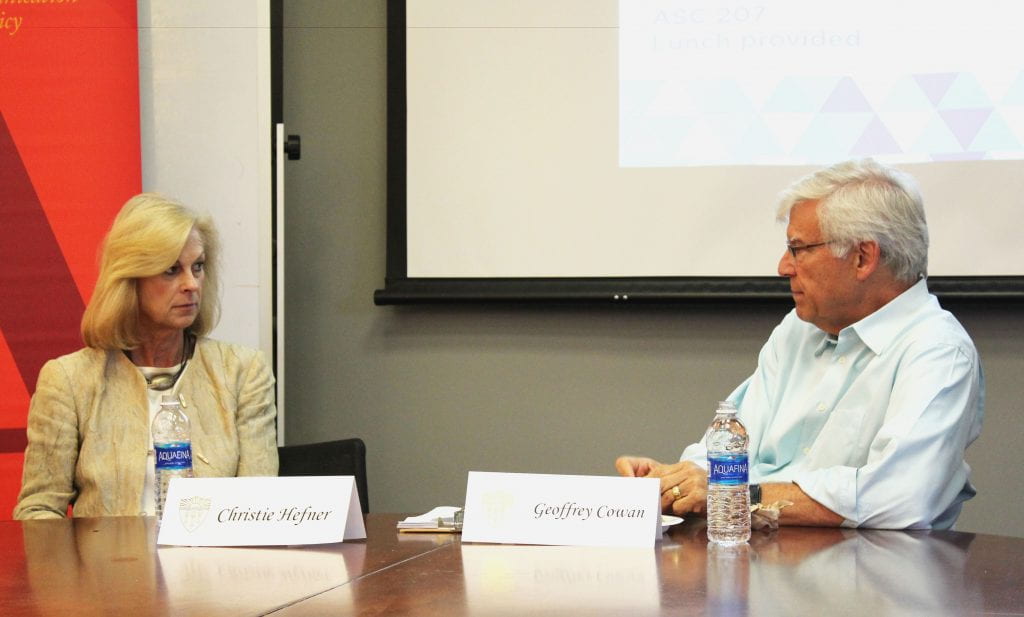At a time of growing awareness about the challenges women face in the workplace, the Center on Communication Leadership & Policy hosted two female business leaders for talks on digital entrepreneurship, women’s rights, and introversion.
Former Playboy Enterprises CEO Christie Hefner visited the Annenberg School for Communication and Journalism on September 20, while author and online entrepreneur Morra Aarons-Mele came the following week. Both women spoke about their roles in entrepreneurship and media, and the steps that ambitious female leaders must take to become successful in the 21st century.
Hefner, who led Playboy from 1988 to 2009, currently serves as the chairman of brand innovation company Hatch Beauty and is on the advisory board of the RDO Companies, an agricultural conglomerate. At the event, she talked about the steps she took to transition Playboy from a print-only magazine to an online presence, as well as a diverse company with multiple assets. The event, which was co-hosted by Annenberg Career Development, was moderated by CCLP Director Geoffrey Cowan. Cowan talked to Hefner about how she decided which parts of the business she needed to shed and which she decided to keep as print advertising dwindled and business moved online.
“There are challenges with successful legacy companies reinventing themselves because of the dynamic that works against that,” Hefner said. “The skills that got them there aren’t necessarily the skills that are going to take them to the next phase.”
Difficult business decisions, Hefner said, were only part of her job — she also had to make difficult hiring decisions, which she said were never 100 percent successful. But the number one skill she looks for is intellectual agility — which she described as “the ability to think differently, take on new tasks and challenge your own conventional thinking.”
“With intellectual agility comes not only the ability to contribute to your organization, but the ability to keep inventing your work and your job,” Hefner said. “You will do a lot of that in your lives because that’s the nature of where the world is and is going.”
Hefner also addressed her views on feminism and diversity in the workplace, which she said were a large part of her work at Playboy. The magazine has been hailed as a harbinger of the sexual revolution, but it has also been criticized by many feminists for its sexually explicit imagery of women. Hefner, however, said that feminism and pornography don’t have to be mutually exclusive, and she wanted to guide Playboy in a way that portrayed positive sexual imagery.
To that end, Hefner spoke about her support for the First Amendment and press freedom, and described how she worked to make Playboy a company that was welcoming to women. She actively made an effort to hire more women, Hefner said, because not doing so would put her business at a competitive disadvantage.
“Leadership, diversity and innovation are inextricably linked,” Hefner said. “Take any one of them away and you will get less than optimal results.”
And, she added, the conversation was not just about gender diversity, but also about diversity of experiences and diversity of thought.
“If you can construct diversity in the workforce, in the rooms where decisions are made, we know over and over again from research that better solutions come out of that than if the people sitting in the room are all very similar,” Hefner said.
In her talk — which was moderated by Annenberg professor Miki Turner — Aarons-Mele also addressed success, but from an individual rather than a corporate angle. The founder of social impact agency Women Online, she recently published her book Hiding In the Bathroom: An Introvert’s Roadmap to Getting Out There (When You’d Rather Stay Home), about her experiences as an introvert trying to be successful in a business world that favors extroversion.
Aarons-Mele started out by dispelling several myths about introverts — like the idea that they don’t make eye contact or don’t like to talk — and instead defined an introvert as a person who gains energy from being alone. With that in mind, she said that a traditional “business” environment — with open office plans and constant social functions — made her feel like she hated going to work each day. She then asked those in the audience to consider — “do I hate the work I am doing or the environment I work in?”
She added that anxiety can also affect introverts’ ability to work in the business sphere, but that it can be managed as long as they have the time they need to recharge. Being in the public eye, she said, can also be difficult if you’re not prepared to handle some of the backlash.
“How many of you feel like you can put your work armor on and get stuff done?” Aarons-Mele asked. “If you want to have any sort of public life, you have to get used to being out there and people saying mean things about you.”
Aarons-Mele brought up what she called “adopting an extrovert” — the idea that you can find a mentor or a friend who is extroverted and can guide you through the social functions and networking events that are often crucial in order to succeed in business. And ultimately, she said that introverts may be surprised what they can discover about themselves by trying out new environments and career options.
“There’s a little bit of extrovert in every introvert,” Aarons-Mele said.
CCLP aims to host speakers like Hefner and Aarons-Mele in an effort to promote the activities of women in media and business, and to provide a platform for them to discuss their experiences and opinions in front of students, staff and faculty members. This goal goes hand-in-hand with CCLP’s Women & Communication Leadership initiative, which focuses on scholarly research, policy analysis and professional executive training.
